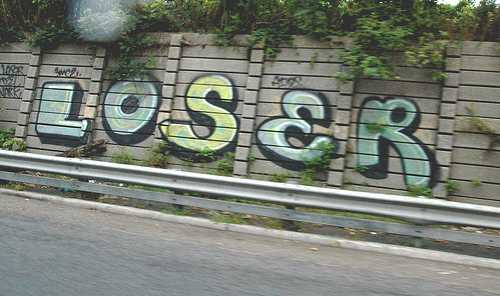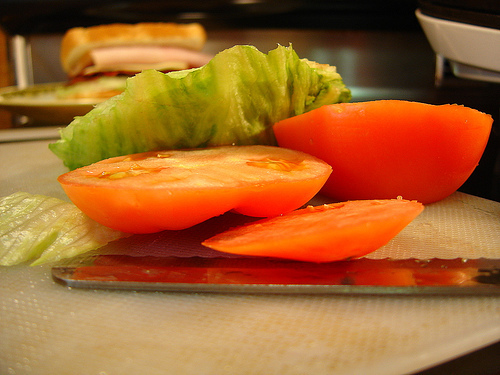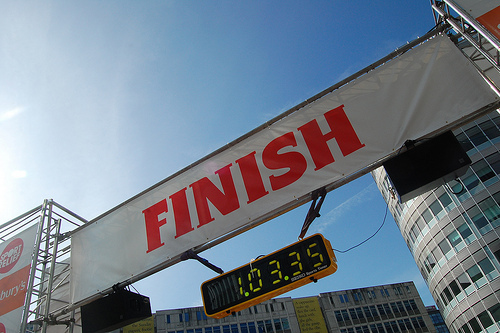Paul Garrigan's Blog, page 27
September 12, 2013
How to Talk Yourself Out of Being a Loser
I suspect most of us are usually oblivious to the enormous impact the words we use have on our life. I’m not talking about how we piss other people off by saying hurtful things – I mean the way we can talk ourselves into being losers.
It has recently come to my attention that I’m a bit of a whiner. I automatically complain about everything. If I won millions of dollars on the lottery tomorrow, I’d moan about having to go and collect the winnings.
I’m always complaining about my work to me wife – either because I’ve too much or too little of it. I bore her with my fears for our financial future but then complain when a client sends a bit of extra work my way.
How to Talk Yourself into Depression
I’ve been dealing with periods of depression since my early twenties. I’ve never needed to take any medication to control it, but this blackness has definitely held me back in life.
I now know that the source of my melancholy is unhelpful thought patterns. I’m always on the lookout for potential dangers, and I’m always able to find them. If I’m not worried about my finances, I’m worried about getting cancer.
The fact that I’m so focused on threats in the environment becomes obvious in the things I say – it explains all the whining and moaning. I don’t mean to be a pain in the ass – it is just the way the world appears to me sometimes.
I’m sure if I dropped dead tomorrow, the only words my six-year-old son will remember me for saying are going to be ‘don’t do that, it’s too dangerous’ – I must say these words to him at least ten times a day, and it will be a miracle if he doesn’t develop a major complex.
Changing the Things I Say
If I spend less time complaining about things, it is going to break my negative thinking habits. I’m sure this is correct because in order to stop saying negative things I have to keep challenging my thoughts.
Not only have I decided to stop complaining, but I’m also training myself to say positive things. I’m not going to lie when doing this – what would be the point – I have to think of truly positive things to say. This means I’m training my mind to see the positive in life.
They say that it takes about 28 days to form new habits. For the last three weeks, I’ve been forcing myself to see all the good around me – there is far more than I ever imagined. I’ve also significantly reduced the amount of complaining I do. Once these new habits take root, I’m convinced it will eliminate most of my episodes of depression.
September 11, 2013
Action is More Powerful than Magical Thinking
It would be so wonderful if I just needed to spend a couple of minutes every day visualizing my desires to make them a reality.
Perhaps it would only take a few hours of picturing my dream house (spread out over a couple of years) to manipulate the universe into delivering my new expensive pad. What an excellent deal – screw working for a living.
The problem with this shortcut to riches is that it doesn’t work. I know because I’ve been trying to use magical thinking for years.
The Power of Prayer
I’m not a believer in any particular god, but I like to imagine there is something in charge of this wonderful ride we call life. I’ll admit my willingness to believe in this unseen force is closely related to my level of desperation at the time.
There have been many occasions over the last couple of years when I’ve begged the universe to give me a break. Just one tiny miracle – ideally it would involve a ton of money, so I could become a man of leisure.
My flirtations with the gods of the universe haven’t produced any staggering successes up until now. If I’m honest, I’d have to say that my attempts to ingratiate myself with these invisible forces have only made things worse – perhaps begging for a handout pisses them off?
I’ve come close to giving up on prayer completely until it dawned on me that I’d being going about things the wrong way. I’d been begging for ‘manna from heaven’ when what I really needed was the motivation to get off my arse and get my own manna.
Instead of expecting the universe to deliver like Amazon, I’ve changed my tactics. I no longer ask for freebies but instead for the motivation and skills to get what I need – so far this approach has been 100 per cent successful (thanks God if you are up there).
Magical Thinking as Learned Helplessness
It wouldn’t be so bad if magical thinking was merely ineffective – the problem is that this passiveness makes me less likely to achieve anything. It leads to form of learned helplessness. Instead of taking action to fix my life, I’m waiting for something effortless and magical to happen.
The only thing I get from sitting around and waiting for the universe to sort out my life is a sore arse. The world is organized in such a way that those individuals who are willing to show a bit of gumption reap the rewards.
The real irony in all of this is that it is the struggle to turn my dreams into reality where I find the most satisfaction in life. If magical thinking worked, the world would quickly become an incredibly dull place.
The Real Secret to Success
The only way to become rich from magical thinking is to write books about it. The world is full of people like me looking for a short-cut to success, and we are willing to hand over our cash for a bag of beans less wonderful than the ones given to Jack.
The key to achieving dreams is simple, but it is often not the answer we are looking for – it sounds much more difficult than ordering the universe around by means of a vision board. The secret to success can be summed up in this single sentence:
We become willing to do what most other people are never going to do.
Life can feel incredibly unsatisfying when we wait for our desires to materialize out of thin air. When we are not willing to do whatever it takes to achieve our goals, we achieve very little – no wonder we get depressed.
September 10, 2013
Visualizations, Process Orientation, and Regular Rewards to Boost Motivation
Are you sick of setting goals and failing to achieve them?
I’m going to share my recent discovery to help you to stay motivated until you reach your goal.
The Importance of Self-Discipline
I’ve a poor track record when it comes to achieving my goals. I’ll always start off super-eager but along the way my motivation has a habit of fizzling out. I now know this lack of self-discipline is due to my approach to getting things done.
One the main motives behind my recent experimentation with juice fasting has been to increase my level of self-discipline. I want to develop the tenacity to see things through to the end – no more excuses.
I used to believe self-discipline was all about doing things I didn’t want to do. My recent adventure with controlling my food intake has shown me the opposite is true:
Real self-discipline involves making the process of achieving my goal highly desirable – so I want to do the work.
The problem with the white-knuckle version of self-discipline is that it is not sustainable. This is why most of us will struggle to get lasting results from diets.
I can force myself to do something I don’t like, but it requires a huge amount of effort. There is a limit on the energy reserves available to power this unnatural form of self-discipline so eventually I crash and burn.
Sustainable Self-Discipline
There is a way to remain self-disciplined indefinitely, and it involves harnessing the power of desire. By getting excited and enthusiastic about what I’m doing, it provides an endless supply of motivation.
I can tap into this free energy for self-discipline by repeatedly visualizing how great I’m going to feel when the goal is complete. I make myself feel these emotions as if I’d already reached this target.
Another trick I’ve started using is to set myself regular rewards for achieving targets – this means that every time I hit a target my motivation receives a boost. Instead of feeling guilty for spending money on myself, I now see that this as my payment for a job well done.
I’ve also found out that it is important for me to celebrate my successes and revisit my memories of achieving goals. This allows me to see that the effort is going to be worth it. I now try to think back on old wins at least once per day and before I begin any new challenge.
Process Orientated Self-Discipline
“Life is what happens to you while you’re busy making other plans”
John Lennon
There are two paths towards achieving anything – one is goal orientated and the other is process orientated.
In the past I’ve tended to be goal orientated. This meant my mind was focused on the final destination, and I viewed the work to get me to my goal as in the way and undesirable.
The problem with the goal orientated approach is that I spend the great majority of my life working towards goals rather than achieving them. By focusing all my attention on the goal, I spend 99.9 per cent of my life waiting for something better to happen – this is not the life of a winner.
Process orientation means enjoying the work involved in doing anything just as much (if not more) than the goal itself.
This ability to appreciate the process of steadily moving towards a target means there is no strain to remain motivated. It can be like making it to the top of the mountain every day.
How to Stay Motivated Long Enough to Achieve Your Goal
Here are my five tips for staying motivated long enough to hit your targets:
• Learn to love the process of working towards your goal
• Remember your past victories
• Feel excited about what you are doing
• Imagine as clearly as you can how you expect to feel when you achieve your goal
• Set small rewards for reaching targets along the way to your goal
• Be sure to celebrate your achievements
September 9, 2013
Another Ten Weeks of 5:2 Intermittent Fasting
I recently completed a 15 day juice fast, and today I’m launching into ten weeks of 5:2 intermittent fasting. This means that I’ll have two 24-hour periods each week where I won’t be eating anything. I attempted this same challenge last year, but I only made it to eight weeks – this time I’m going all the way.
The Goals of 5:2 Intermittent Fasting
I found the juice fast to be an enjoyable experience, and this had a lot to do with having clear goals from the beginning. I undertook the challenge in order to gain some control over my sugar cravings and increase my self-discipline. I sort of lost sight of my goals with the last period of 5:2 intermittent fasting, and this is why it became so easy to quit – I didn’t have a good enough reason to continue. This time my goal is clear:
I want to improve my ability to differentiate between real hunger and the urge to eat for comfort. I also want to learn to enjoy the feeling of being hungry.
5:2 Intermittent Fasting to Recognise Hunger Pains
My experiences with mindful eating has shown me that I often mistake feelings like tiredness or boredom for hunger. This means that I’m regularly stuffing things in my mouth when there is no need to. I want to use the next twenty fast days to help me become better at recognizing hunger.
5:2 Intermittent Fasting to Learn to Enjoy Feeling Hungry
Feeling hungry is the way the body tells me that it is time to eat, but I can go months without ever really experiencing hunger. This is because I’m ‘grazing’ all day long so my stomach is never empty. I don’t believe this is healthy, and it is during these months of never feeling hunger that I pile on the weight.
It is only since hitting middle-age that I’ve stopped allowing my stomach to go empty. It’s not something that I’ve consciously decided – I work from home so grazing is easy because I’m never far from the fridge. When I worked as a nurse there were days when we were too busy to take a break. I didn’t mind because it felt so nice to eat after being hungry for a couple of hours – they are right about it being the best sauce. I want to regain my appreciation of hunger during these ten weeks of fasting, so I can stop grazing all day like a cow.
I’m Not Weighing Myself during My Ten Weeks of 5:2 Intermittent Fasting
Another big mistake I made with my last 5:2 intermittent fast was getting on the weighing scales too regularly. I stopped losing weight about half-way through, and I became disillusioned – this became a drain on my motivation. This time I’m not going to weigh myself at all until the end. My weight after the juice fast was 82.2 kg, and it would be nice to get it a bit closer to 75 kg over the next ten weeks.
The other things I’ll be doing differently with this juice fast include:
• I will eat 500 calories on the morning of the fast day and go twenty-four hours without food – so the time I finish this meal will be the time I start eating the next day.
• I’m going to be exercising far more than I did during the last attempt – I’ll stick to walking on the fast days.
• I’m going to be careful about what I eat on the other five days of the week when I’m not fasting.
• Over the next ten weeks I’m going to do research on healthy recipes, so I’ll have changed to a diet that is more nutritious and delicious by the end of the fast.
September 7, 2013
Successful Addiction Recovery is Not about Handouts
In this video I discuss the importance of taking action to make things happen in recovery. If we sit back and wait for the universe to shower us with goodies, we could be in for a long wait. Press play to watch the video:
Remember Past Successes for Motivation Today
Spending too much time thinking about the past or future is the fast-track to depression. Living in the moment is the key to happiness, but I’ve found that strategically thinking about the past can actually bring some benefits.
The Danger of Not Savoring Success
I rarely think about my past successes, but I’m learning that this is a mistake. I wrote a post on here a few months ago about how I am not proud of my achievements. It turns out that my lack of appreciation for my progress actually makes it harder for me to be successful in the future.
Achieving anything significant in life involves sacrifices. The way I develop the motivation to succeed is by thinking about future rewards. I become willing to work hard today because of what I am going to get tomorrow. It’s a good system but problems occur when I cheat myself out of the reward. This happens when I fail to savor my achievement – instead of getting a reward I give myself a new goal to work on.
It may be due to low self-esteem, but it sort of feels unseemly for me to feel proud of my achievements. I feel uneasy with compliments, and I don’t even like to celebrate my birthday. I want to keep pushing myself forward to the next goal, but my unwillingness to enjoy my victories means that this is getting harder to do.
I like this saying:
‘Fool me once, shame on you – fool me twice, shame on me’
When I set myself a goal with the promise of a reward at the end, I cheat myself by not fully enjoying my victory. This means that I need to work harder the next time to develop the motivation to achieve the next goal (fool me twice). The reward I promise myself may be in the form of a physical item (e.g. some new music), but it is really the satisfaction of achievement that I’m anticipating. Without this reward my life becomes an endless slog towards a target that is always moving further away from me.
Remembering My Achievements to Boost Motivation
The problem with looking forward all the time is that life becomes a race towards death. It is hard to stay motivated when the only benefit of achieving one goal is to be given a new one. This is why remembering my past successes can be such a great help. By spending a little time each day patting myself on the back, it gives me the strength to keep going forward – it is a reminder that doing this stuff is more than just a way to waste time.
September 5, 2013
Mental Gymnastics Turn a Loser into a Winner
I’ve found reverse-snobbery to be helpful when dealing with those areas of my life where I underachieve. Using clever mental gymnastics I am not only able to justify mediocrity, but I can almost feel superior because of it. The only problem with this brand of cognitive dissonance (the art of pretending you don’t want what you want) is that reality always finds a way to break through – this can be painful when it happens.
Smart People are Dumb
I got kicked out of school at fifteen before I’d time to gain any qualifications. I compensated for my lack of education by pretending that it gave me an advantage in life. I became convinced that university students were as dumb as plankton – they had no common-sense. I surrounded myself with like-minded souls who shared my passion for mocking the educated – we congratulated each other for qualifying from the ‘school of hard knocks’ as we knocked back our first beers of the morning.
My reverse-snobbery towards students lasted until my early twenties. I held onto it like a life-raft during my years working as a barman in Oxford – I regularly over-changed the university toffs as a type of idiot-tax. Reality intruded into my life when I began dating a third-year student. She might have had shitty taste in men, but she certainly wasn’t dumb. My mocking scorn of the educated turned to bitterness. Being with this girl forced me to face my dark secret – my lack of education meant I felt like a loser.
My insecurity around our differences in educational attainment ruined the relationship, but it was one of the best things to ever happen to me. I spent the next eight years studying. At the beginning of that journey I couldn’t even spell ‘university’, but in the end I walked away from one of these institutions with a degree – I now even have a post-graduate qualification.
Fighting Cognitive Dissonance on a New Battlefield
Getting an education didn’t mean the end of my reliance on reverse-snobbery to protect my ego. In recent years it’s allowed me to justify my turbulent financial situation. I console myself with the idea that successful people aren’t really happy. I play down their achievements by pretending they are just lucky or that they have benefited from a rich mammy and daddy. Of course this is all complete bollocks – the reason these people are successful is that they are willing to do things I haven’t been willing to do.
Cognitive dissonance is a poor substitute for achievement. It is a drug that provides a temporary source of comfort but comes with a heavy price. Life is too short for the mental contortions I need to perform so I can pretend I don’t want what I really really want. It is much easier to just get out there and achieve something.
September 4, 2013
Financial Security by Age Fifty
Becoming financially secure by age fifty is now my priority in life. I have slightly less than six years to achieve this goal – it seems like a long time, but I know it will pass by all too quickly. I’m going to tackle this project with the intensity it deserves, but there is going to be plenty of fun along the way.
My current financial situation is unacceptable to me. Living from month-to-month was fine as a single guy, but I now have a family. I’ve wasted far too much time worrying about my finances – if I’d used this energy to actually do something constructive, I’d be in a much better position now. I’m completely to blame for my current situation and now is the time to put things right.
What Does it Mean to be Financially Secure?
‘Financial security’ is a bit of a woolly concept. My current definition of what this means is modest and would include four elements:
• Clear my debts – I owe €6000 (about US $8000)
• Buy a house – a starter-home here in Rayong averages 1,000,000 THB (about €25,000 or US $31,000).
• I need to be earning the same amount of money from writing as I would get working as a nurse back in Europe (my old career) – this would be about €30,000 (US $39,000) a year. I’ve no savings or retirement plan so it needs to be at least this amount.
• I need to be earning the bulk of my money from my own writing rather than the content I provide for clients.
I know that these goals are realistic and achievable within a six year period.
The Cost of Financial Worry
Worrying about my financial situation has cost me a great deal of money. This stress has been a drain on my motivation, and it has interfered with my ability to make good decisions. Worry makes me tired and depressed. It means that my focus is always on the obstacles rather than the opportunities available to me. Worry is just an excuse for failure, and I’ve already overindulged at the self-pity pot.
I work as a freelance writer, and there have been a few periods when the work has dried up. The truth is that these periods don’t justify my financial struggles. I regularly turn clients away with the excuse that I’m too busy. My problem is not really lack of work, but my inability to make the most of my opportunities coming my way. Up until now, I preferred to waste time worrying rather than doing the work that would lead me to financial freedom.
The Motivation Needed to Achieve Financial Security
I didn’t break away from my almost two-decade long alcohol addiction by worrying – that is what kept me trapped for so long. In order to escape, I needed to make it my number one priority in life. I’m going to do the same here. For the next six years I’m going to make achieving financial liberation my main focus. I’ll start by eliminating everything that is getting in the way of reaching this goal – this means worry, negativity, and excuses have to go (no exceptions).
I’m going to make everything in my life serve this goal of financial security. I will exercise daily and eat sensibly because this will give me the energy I need to succeed. I’m going to continue to meditate every day so I can enjoy good levels of concentration. I’ll make time for my family because taking care of them is really what this goal is all about. I’m also going to have plenty of fun because otherwise there is no point in trying to achieve any goal.
Enjoy the Process of Achieving Financial Security
A mistake I’ve made too many times in the past is focusing on the destination rather than the journey. The problem with this is that life happens on the way to a goal – that’s where the real happiness is to be found. I feel super-excited about this six-year project. It is going to be such great fun to work on this challenge – it is going to give my life a new meaning and purpose.
September 3, 2013
Why Some People Fail to Find Happiness after Quitting Alcohol
Some people who have been sober for many years may even end up committing suicide because they feel so depressed. A common reason for why this happens is that people enter recovery with a sense of entitlement, and they fail to put in the work required to create the life they desire. Press play to watch the video – you will find the podcast of this episode below:
Press play to listen to the podcast:
Podcast Powered By Podbean
September 2, 2013
Wonderful Sense of Renewal at the End of My Fifteen Day Juice Fast
“I no longer associate juice fasting with deprivation – it is a pleasurable process that rejuvenates the body, mind and spirit”.
This fifteen day juice fast has been a life-changing experience. I’ve enjoyed doing it, and I’m now experiencing a real sense of renewal in my life. The motivation for this period of fasting came from a desire to beat my sugar cravings and to improve my self-discipline. I also wanted to make up for failing to complete a 15-day fast last year. I’ve achieved my goals, and this feeling of renewal is a wonderful bonus.
Juice Fasting is Life Changing
There is a great deal of talk about the powerful detox effects of juice fasting. I’m not qualified to provide a judgment on this, but I definitely do feel as if my body has been completely cleansed. There has also been a definite shift in my thinking, and I feel far more positive and in control of my life. It could be that by freeing the body of the chore of digesting solid food meant there was ample time for repair and rejuvenation. I do feel rejuvenated not only physically, but also mentally, and emotionally.
I’ve achieved lots of great stuff since walking away from the life of a drunkard seven years ago. I’m deeply grateful for my second-chance, but I do sometimes take it for granted. The last two years haven’t been so great for me. I’ve had financial worries, and I’ve given my fears too much control over my life. This has meant periods of depression and sometimes even feelings of hopelessness. I’ve felt cheated because life hasn’t been serving up all the good things that I’ve come to expect. I can now see that this way of thinking is self-defeating bullshit – the only thing I deserve in life is what I’m willing to go out there and take.
This juice fast has brought me to a new turning point– maybe that’s the real purpose of undertaking this type of challenge. Many great spiritual teachers underwent a period of fasting before they began their mission. I’m no spiritual teacher, I can barely take care of myself, but I now understand why they did this. What better way is there to enter a new era of your life than going through this process of rejuvenation and renewal?
Weight Loss from My Juice Fast
I didn’t weigh myself during the fast but at my weigh-in this morning I felt delighted to see that I’d lost 6.2kg (13.6 pounds). I’m still overweight at 82.2 kg (181 pounds), but my next challenge is 10 weeks of 5:2 intermittent fasting so that will mean a further reduction. It is easy to put the weight back on after a juice fast, but this is part of a process for me – it will ultimately lead to a sustainable way of healthy living.
I felt so excited about eating again today that I woke up at 4am. I ate an apple but afterwards felt too full to eat anything else. It’s now the afternoon and so far all I’ve had is a bowl of cereal and some Philadelphia cheese on cucumber slices (fewer calories than crackers). My wife predicted that I’d raid the fridge after the fast (I did the last time), but it hasn’t happened. I don’t even feel hungry.
I’ve no plans for my next juice fast, but this is something that I do want to do again. It might be a good idea for me to do this once a year. I no longer associate juice fasting with deprivation – it is a pleasurable process that rejuvenates the body, mind and spirit.
Paul Garrigan's Blog
- Paul Garrigan's profile
- 3 followers











